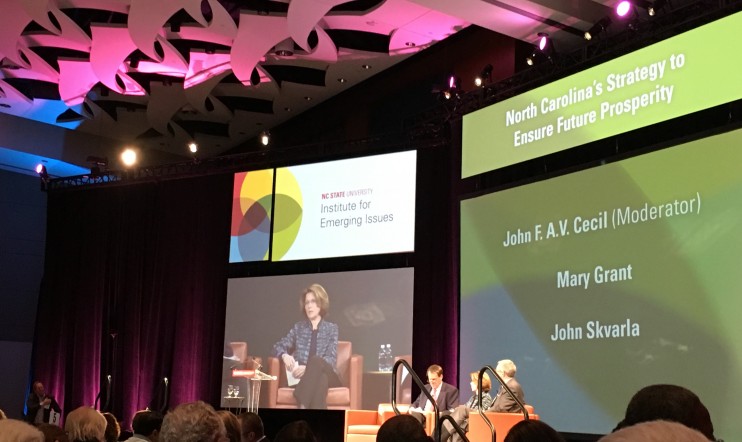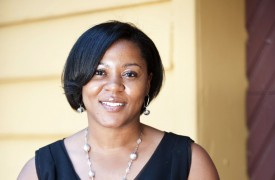
In February 2016, the Institute for Emerging Issues – a ZSR grantee – held its 31st annual Emerging Issues Forum. From the moment I walked in, I knew there was going to be something different about this conference. Off in the distance, among conference participants huddled together, you could see robots and booths full of information about technology and new technology concepts. The entire room looked like a scene out of a sci-fi movie. Yet, it clearly set the stage for what was to come over the course of the next two days.
FutureWork was the name of the conference, but it was also a proposition to attendees and to the state of North Carolina. These two words alone spoke to the need to embrace the intersection of changing technology, generational and population shifts, an evolving statewide landscape, and the undeniable impact of the global economy. These two words created the momentum for a conversation that positioned conference participants to ask hard questions like: How do we strengthen and build local economies given these changes? What are the opportunities, challenges, barriers? What happens if we do nothing? Or, what magic will emerge if we embrace this phenomenon and strategically position rural and urban communities throughout the state differently? How do we make sure that everyone benefits? And how does addressing equity and poverty strengthen the return on our state’s investments in economic development?
My creative juices were sparked time and time again. We heard from Dambisa Moyo, an international economist and futurist, who spoke of the challenges and opportunities of creating jobs in an era of increasing technological changes, but slowed global population growth – and how those trends are impacting key economic growth drivers such as capital, labor, and productivity.
Kevin Johns, the Economic Development Director from Austin, Texas, talked about his work spearheading a strategy to fuse creative and traditional economic development partners to eliminate generational poverty and capitalize on cultural diversity as a driver for economic growth.
Jaylen Bledsoe, a technology prodigy, discussed brand development, cultivating smart relationships and the need to expose young people to technology in order to make it more powerful.
And Vivek Wadhwa, a technology entrepreneur and scholar, led a conversation about the importance of diversity in the tech pipeline as a critical component to spur innovation and mitigate health disparities.
It was clear that this conference was intentionally designed to create a sea-change, which is necessary to forge a solid foundation for all of us to think about our work, relationships, and partnerships in new and different ways. We became more informed of the changing demographics that our state is facing – and were stretched to think about ways we can build and strengthen local and regional economies that work for everyone. Local economies that connect to the global economy.
As we plan for the future of work in North Carolina, success will depend upon our capacity to equip a growing workforce with necessary skills that align with changes in technology and to create space for diverse populations as a source of innovation. As the Foundation continues to shape the investments in its community economic development portfolio, consideration of a proposition like this is essential as we work to narrow the racial and gender wealth gap and support evolving workforce development initiatives that create career ladders, supports, and private/public partnerships. We are excited to continue to think about the future of work in this state, and welcome your thoughts and feedback as we work to advance the Foundation’s mission and accelerate the prosperity of the communities we serve across North Carolina.
